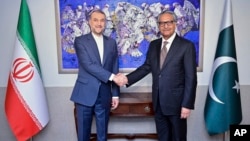Pakistan and Iran agreed Monday to broaden political and security cooperation to confront terrorism after exchanging unprecedented missile strikes earlier this month against alleged militant bases in each other’s territories.
The understanding stemmed from a meeting Pakistani Foreign Minister Jalil Abbas Jilani hosted with his Iranian counterpart, Hossein Amirabdollahian, in Islamabad.
"There was an agreement to cooperate to fight terrorism in our respective areas. We need to address and allay each other’s concerns with regard to terrorism,” Jilani told a news conference alongside the Iranian foreign minister.
He said that Pakistan and Iran had decided to immediately deploy “liaison officers” in their respective Turbat and Zahedan border towns to “further strengthen ongoing security and intelligence cooperation.”
Amirabdollahian said Iran and Pakistan “strongly respect” each other's “sovereignty and territorial integrity.”
He added, “We will tell all terrorists that we will not … provide them with any opportunity to endanger our common security.”
The chief Iranian diplomat, without elaborating, pointed figures at “third countries” for supporting militants in border regions of Iran and Pakistan.
"There is no doubt that the terrorists located in the common border regions and areas of Iran and Pakistan are led and supported by third countries, and they never favor any good actions in line with the benefits and interests of the Iranian and Pakistani governments and nations,” Amirabdollahian said.
The two foreign ministers said they had agreed to hold regular meetings at the highest ministerial and military levels to prevent any future “misunderstandings.”
Military tensions between Tehran and Islamabad escalated on January 17 when Iranian security forces launched airstrikes into the turbulent southwestern Pakistani border province of Baluchistan against what Tehran said were the “strongholds” of anti-Iran Sunni militant group Jaish al-Adl, or the Army of Justice.
Nuclear-armed Pakistan condemned the cross-border incursion, saying it killed two children and injured several other civilians. It swiftly recalled the Pakistani ambassador to Tehran and asked the Iranian ambassador to leave Pakistan, suspending all planned meetings between the two countries.
Two days later, Islamabad carried out similar airstrikes against what it said were terrorist hideouts in Iran's southeastern border province of Sistan-Baluchistan. Iranian officials said the strikes killed nine Pakistani nationals, mostly women and children.
The two countries, however, have since agreed to de-escalate tensions and allowed their respective ambassadors to resume duties, leading to the Iranian foreign minister’s visit to Islamabad on Monday.
Iran and Pakistan share a 900-kilometer-long border and routinely accuse each other of not doing enough to prevent fugitive anti-state militants from using their respective territories to plot cross-border attacks.




